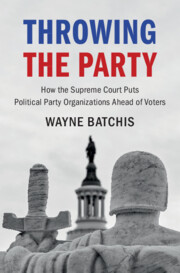Book contents
- Throwing the Party
- Cambridge Studies on Civil Rights and Civil Liberties
- Throwing the Party
- Copyright page
- Contents
- Preface
- Acknowledgments
- Part I Foundations
- Part II Party Primaries
- Part III The Party, the Court, and Campaign Finance Law
- Part IV Passé Equal Protection and a Way Forward
- 11 Party and Equality
- 12 The Political Question
- 13 A Potential Solution
- 14 Conclusion
- Index
13 - A Potential Solution
The Party System as a Public Forum
from Part IV - Passé Equal Protection and a Way Forward
Published online by Cambridge University Press: 16 June 2022
- Throwing the Party
- Cambridge Studies on Civil Rights and Civil Liberties
- Throwing the Party
- Copyright page
- Contents
- Preface
- Acknowledgments
- Part I Foundations
- Part II Party Primaries
- Part III The Party, the Court, and Campaign Finance Law
- Part IV Passé Equal Protection and a Way Forward
- 11 Party and Equality
- 12 The Political Question
- 13 A Potential Solution
- 14 Conclusion
- Index
Summary
Categories matter in First Amendment jurisprudence. The freedom of speech and its derivative rights1 work as a remarkably powerful immunity from ordinary law. Cabining and defining this immunity categorically serves to promote clarity and certainty that First Amendment freedoms will be there as a reliable shield even when deeply unpopular, and it also provides the flexibility to give sufficient weight to nonexpressive interests where appropriate. Categories can refer to discrete kinds of content deemed to receive less than full First Amendment protection, such as true threats, child pornography, and libel. Categories are also used to differentiate kinds of speakers – a government employee versus a private employee, an individual human being versus an associational entity comprising multiple human beings, the government versus a private corporation. Finally, categories are used to distinguish various platforms for expression, whether differentiating a public forum like a public park versus a private forum such as the inside of a private home; a privately owned public place like a shopping mall versus a limited public forum controlled by government that serves a narrow constituency, such as a system for registering and funding student organizations at a public university.
- Type
- Chapter
- Information
- Throwing the PartyHow the Supreme Court Puts Political Party Organizations Ahead of Voters, pp. 222 - 243Publisher: Cambridge University PressPrint publication year: 2022

